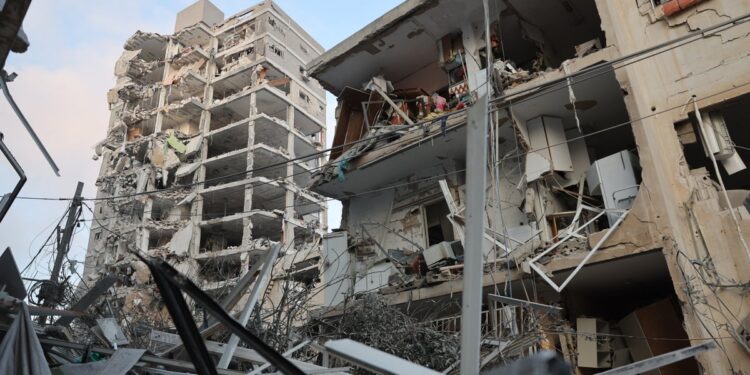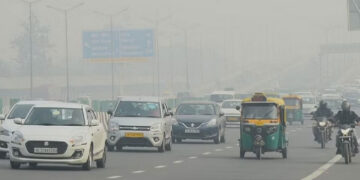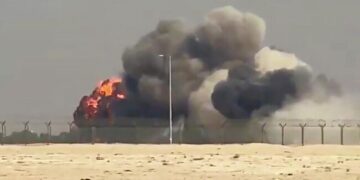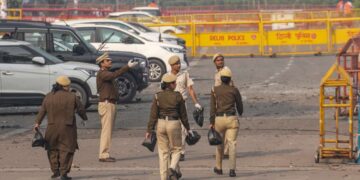 Israel-Iran conflict: The intensifying Israel-Iran conflict has plunged the Middle East into turmoil, as escalating military exchanges have left dozens dead and hundreds injured. Over the weekend, Israel launched airstrikes targeting key Iranian infrastructure and leadership figures, resulting in the death of Mohammad Kazem, the intelligence chief of Iran’s Revolutionary Guards. In response, Iran launched a barrage of missiles at Israel, killing 10 people, including children, and injuring over 380.
Israel-Iran conflict: The intensifying Israel-Iran conflict has plunged the Middle East into turmoil, as escalating military exchanges have left dozens dead and hundreds injured. Over the weekend, Israel launched airstrikes targeting key Iranian infrastructure and leadership figures, resulting in the death of Mohammad Kazem, the intelligence chief of Iran’s Revolutionary Guards. In response, Iran launched a barrage of missiles at Israel, killing 10 people, including children, and injuring over 380.
This ongoing Israel-Iran escalation has provoked serious concern from global powers. The violence has not only deepened the rift between Iran and Israel, but has also disrupted nuclear negotiations and raised fears of a broader regional conflict.
Tehran Responds to India’s Evacuation Request
Amid the escalating Israel-Iran conflict, India has urged its nationals in Iran to consider evacuation as a precautionary measure. Tehran responded positively, coordinating with Indian authorities to facilitate the safe return of Indian citizens. The Ministry of External Affairs (MEA) in New Delhi is closely monitoring the situation as tensions in the region continue to rise.
Toll Mounts Amid Fierce Military Strikes
As of Monday, the death toll continues to climb. Iran’s Health Ministry confirmed that over 230 Iranian civilians have been killed in Israeli strikes since Friday. Meanwhile, Israeli officials reported 13 total fatalities, with casualties including women and children, following Iran’s retaliatory missile attacks.
The most significant Israeli airstrike occurred on Sunday, targeting high-ranking Iranian officials. The strike killed Mohammad Kazem, Iran’s key intelligence commander, delivering a heavy blow to the Revolutionary Guard’s leadership.
Diplomatic Fallout: Talks Cancelled, Blame Traded
These violent exchanges have derailed diplomatic efforts. Iran cancelled the sixth round of nuclear negotiations with the United States, originally scheduled in Oman, citing Israel’s aggressive military actions.
Iranian Foreign Minister Abbas Araghchi accused Israel of deliberately sabotaging diplomatic progress, calling the airstrikes an “attempt to undermine diplomacy and derail negotiations.”
On the other hand, Israeli Prime Minister Benjamin Netanyahu reiterated Israel’s firm stance, stating, “The issue here is not de-escalation. The issue is preventing Iran from developing nuclear capabilities.”
Global Reactions: Calls for Ceasefire Grow Louder
Global leaders, including the United Nations, European Union, and regional powers, have condemned the escalating violence. Western nations continue to urge both sides to return to dialogue and avoid actions that could ignite a full-blown Middle East war.
In the U.S., President Donald Trump issued a blunt statement, urging the two nations to “make a deal”, though he hinted they “might have to fight it out first.” His comments drew criticism for their insensitivity amid the humanitarian crisis unfolding.
Despite mounting international pressure, Iran has maintained it will not agree to a ceasefire while under attack, insisting that any discussions must include a halt to Israeli aggression.
Background: Long-standing Tensions Over Nuclear Programme
The root of the Israel-Iran conflict lies in long-standing tensions over Iran’s nuclear ambitions. Israel and its Western allies believe Tehran is secretly developing nuclear weapons, a claim Iran vehemently denies.
The recent attacks appear to be a strategic move by Israel to cripple Iran’s nuclear and military infrastructure, as diplomatic channels stall. With the cancellation of peace talks and rising death tolls, prospects for a resolution appear grim.
Humanitarian Crisis in the Making
As urban areas continue to be targeted, civilian deaths have surged, deepening fears of a long-term humanitarian disaster. Human rights organizations warn of a looming humanitarian crisis in both countries, with essential infrastructure, including hospitals and emergency services, under severe strain. Medical facilities in Tehran and Tel Aviv are reportedly overwhelmed, struggling to cope with the rising number of casualties.
The Israel-Iran conflict has also triggered large-scale displacement, with families fleeing conflict zones in search of safety. International aid agencies have called for immediate access to affected areas to provide medical support, food, and shelter.
Both nations have placed their armed forces on high alert, further heightening regional tension. The fear of escalation beyond the Israel-Iran border now looms large, with neighbouring countries closely monitoring developments and preparing for possible spillover effects. The international community continues to urge restraint, warning that the Israel-Iran conflict could spiral into a broader regional war if unchecked.
















